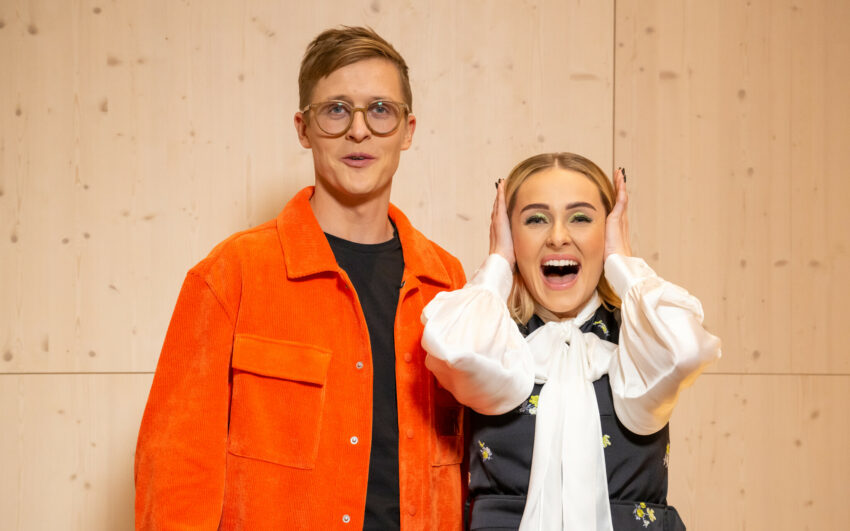Estonia’s public broadcaster ERR continues preparations for Eesti Laul 2023. After the names of the artists who will be part of the line-up for the 2023 edition of the show were announced two weeks ago, ERR revealed in a press release this Friday the names of the Eesti Laul’s hosts in 2023.
Tõnis Niinemets and Grete Kuld have been chosen by the public broadcaster as the hosts of the three Eesti Laul 2023‘s shows that will be broadcast live in January and February. They will be as well the hosts of the special tv show where the songs of the contest will be revealed on 2 December, the same day on which the tickets for the contest will go on sale. The semi-finals of the contest will take place on January 12th and 14th and the Eesti Laul 2023‘s grand final will be on February 11th.
Find out more about Grete Kuld and Tõnis Niinemets, Eesti Laul 2023 hosts
Their television careers crossed two years ago, when both Grete Kuld and Tõnis Niinemets presented the 2021 edition of the contest. Two years later, both of them will be again in charge of hosting the show in which we will know the Estonian artists at Eurovision 2023.
Grete Kuld
Grete Kuld was born in 1989 in Tallinn, the capital of Estonia. She started working in television as a weather reporter on Channel 2. Later, in 2012, she participated in the talent show ‘Stars On Ice’. Since then, she has released two studio albums and has played several acting roles in various Estonian series.
Tõnis Niinemets
Tõnis Niinemets is an Estonian actor born in 1987 in Rakvere. He studied performing arts at the Viljandi Academy of Culture of the University of Tartu and in 2006 he made his debut at the Rakvere Gymnasium Theatre. Since then he has collaborated in more than 20 plays and almost half a dozen films.
Eesti Laul 2023: The distribution of the semi-finals
At the beginning of November, the ERR announced the names of the participants in Eesti Laul 2023 on two Ringvaade’s special programs. A total of 20 artists will try to get one of the 10 places in the grand final on February 11th, where Estonia’s singer in Liverpool will be chosen.
These are the participants of Eesti Laul 2023 and their respective songs:
- Sissi – “Lighthouse”
- Wiiralt & Ultima Thule – “Salalik”
- Carlos Ukareda – “Whiskey Won’t Forget”
- Alika – “Bridges”
- JANEK – “House of Glass”
- Ellip – “Pretty Girl”
- Kaw – “Valik”
- Andreas – “Why Do You Love Me”
- Meelik- “Tuju”
- Elysa – “Bad Philosophy”
- m els – “So Good At What You Do”
- Robin Juhkental – “Kurbuse matused” Neon Letters & Maiko – “Kurbuse matused”
- Neon Letters & Maiko – “Tokimeki”
- Bedwetters – “Monsters”
- Anett x Fredi – “You Need To Move On”
- OLLIE – “Venom”
- Linalakk & Bonzo – “Aeg”
- MERLYN – “Unicorn Vibes
- MIA – “Üks samm korraga”
- Inger – “Awaiting You”
The semi-final in which each of the 20 participants for Eesti Laul 2023 will sing as well as the order of performance of both semi-finals will be announced in the coming weeks.
Eesti Laul 2023: what we know so far
ERR received 217 songs to compete in next year’s national final at the deadline for entries on 20 October, of which 92 songs were in Estonian and 125 in other foreign languages, including entries from repeaters of both the format and the Eurovision Song Contest itself.
The 15th edition of Eesti Laul (‘Estonian song’) will take place over three shows, spread over January and February next year. 20 semi-finalists will compete in the two semi-finals on 12th and 14th of January, after which only 10 will Will go directly to the grand final a month later on 11 February, live from Tallinn.
Estonia’s Eurovision history: Eesti Laul has shaped the last decade
Estonia made its debut at the Eurovision Song Contest in 1994, although it technically attempted to do so in 1993 and was eliminated in the Millstreet qualifying round. Since then, it has participated 27 times, 17 of which have been finals. The Baltic republic was particularly successful between 1996 and 2002, reaching the top 10 in all but one year and achieving the first top 5 finish of any former Soviet country.
In fact, Estonia won the Festival in 2001 in Copenhagen, when Tanel Padar, Dave Benton and the group 2XL won with the song “Everybody”, again marking a milestone as the first ex-Soviet country to win the event. However, between 2004 and 2008, the country failed to qualify for the finals until it managed to recover and gain some stability in its results since Urban Symphony brought the country back into the top 10 in 2009.
In fact, it was in 2009 that the traditional Estonian national final, the Eurolaulwas transformed into a new format, and the Eesti Laulthe Estonian National Final, considerably more successful at times, achieving four more top 10 finishes with Urban Symphony (2009), Ott Lepland (2012), Elina Born and Stig Rästa (2015) and Elina Nechayeva (2018), and four more final qualifiers.
Stefan represented Estonia at the Eurovision Song Contest 2022 in Turin with “Hope”, achieving a top 5 in the semi-final and a respectable 13th place in the grand final.

